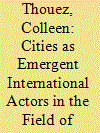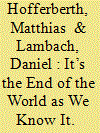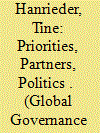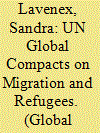|
|
|
Sort Order |
|
|
|
Items / Page
|
|
|
|
|
|
|
| Srl | Item |
| 1 |
ID:
175401


|
|
|
|
|
| Summary/Abstract |
Cities are fast becoming actors on issues of transnational import. This is also true in the field of migration governance where their scope of responsibility has traditionally been perceived as entirely domestic in nature. As mayors act and advocate transnationally on migration, they are supported by a growing web of intercity networks spanning knowledge sharing, to lobbying, to operational work. In parallel, cities’ agency is rising as they begin to acquire access and influence in interstate deliberations and decision-making fora. Their active presence impacts policy instruments like the UN Global Compact for Migration and Global Compact on Refugees, and policy frameworks like the Global Forum on Migration and Development. In turn, as cities provide more information on challenges faced locally, we may expect more pragmatic approaches to migration. This article outlines this expansion of cities’ agency and what it could mean for international migration governance.
|
|
|
|
|
|
|
|
|
|
|
|
|
|
|
|
| 2 |
ID:
175400


|
|
|
|
|
| Summary/Abstract |
This article uses snapshots, rather than the ongoing flows of diffusion/contestation typically emphasized by constructivists, to explore the exercise of power through normative change. Its case is a high-profile Human Rights Council initiative: the UN Guiding Principles on Business and Human Rights (UNGP s). These UNGP s have successfully presented meanings as fixed while actually stretching those meanings’ boundaries. They reconceptualize what it means to “respect” and “protect” human rights. This is surprising given that the principles were framed as a conservative exercise at clarification, and under-noticed due to the legal rather than conceptual focus of the existing critical literature. To respect human rights, according to the UNGP s, agents need to take costly positive action. Furthermore, protect obligations come before respect. These are significant innovations. On the other hand, two missed opportunities of the UNGP s are their thin harm-based foundation for respect obligations, and their state centrism about who has duties to protect.
|
|
|
|
|
|
|
|
|
|
|
|
|
|
|
|
| 3 |
ID:
175397


|
|
|
|
|
| Summary/Abstract |
This article contends that practices of, and reflections on, global governance are diversifying without any particular teleology. Therefore, it proposes a “postgovernance” perspective to capture and make sense of the multiplicity of concurrent developments. Just like post-punk followed punk rock and provided new energy, postgovernance provides opportunities to revitalize debates on world politics. Postgovernance allows both scholars and practitioners to consider the persistence of “traditional” forms of global governance as well as the simultaneous emergence of new approaches. This article thus proposes postgovernance as a mode of world politics in a postparadigmatic world that is dynamic yet inconsistent. We advance this argument by outlining what postgovernance entails, by taking stock of current debates from a postgovernance perspective, and by discussing how these can be advanced from a postgovernance point of view.
|
|
|
|
|
|
|
|
|
|
|
|
|
|
|
|
| 4 |
ID:
175395


|
|
|
|
|
| Summary/Abstract |
The World Health Organization (WHO) is once more asked to reinvent itself and become more effective. This essay discusses recurrent reform proposals directed at the WHO which, in different ways, ask it to find a strategic focus and thereby its niche in the crowded global health arena. Looking back at decades of reform endeavors at the WHO, it exposes the contradictions and unresolved normative conflicts with regard to the WHO’s priorities. Ultimately, the WHO’s effectiveness hinges on Member State support for public authority in global health, and thus the political commitment to protect it against capture by special interests.
|
|
|
|
|
|
|
|
|
|
|
|
|
|
|
|
| 5 |
ID:
175399


|
|
|
|
|
| Summary/Abstract |
Recent scholarship has highlighted the role of domestic pressures in determining state preferences toward the reform of international organizations (IO s). This article adds a new dimension by examining how partisanship and ministerial control affect state preferences toward IO empowerment. The article derives two expectations from the existing literature. First, partisan position will determine preferences toward IO empowerment. Second, when a government is constituted by multiple parties, the position of the party with the IO’s ministerial portfolio will determine the government’s position toward IO empowerment. The article illustrates this argument by examining the positions of four net donors (Germany, France, the United Kingdom, and the United States) and two net recipients (Brazil and India) during the World Bank’s reforms. By bringing domestic politics back in, this article complements existing studies on the politics of IO reform and weighs in on central debates in comparative politics and international political economy.
|
|
|
|
|
|
|
|
|
|
|
|
|
|
|
|
| 6 |
ID:
175396


|
|
|
|
|
| Summary/Abstract |
This year’s UN Charter Day marks the 75th anniversary of the birth of the UN system, providing an important opportunity to reflect on the achievements of the United Nations, and to look ahead at the future of multilateralism. This is also a moment when the principles of multilateralism have never been more important and more in need of support.
|
|
|
|
|
|
|
|
|
|
|
|
|
|
|
|
| 7 |
ID:
175402


|
|
|
|
|
| Summary/Abstract |
As process-oriented, inclusive, legally nonbinding frameworks deemed to promote cooperation in the pursuit of agreed objectives, the Global Compacts for Migration and Refugees adopted in December 2018 introduce modes of experimentalist governance in fields where states have hitherto opposed (new) multilateral commitments. This article retraces the introduction of experimentalist elements in the compacts’ architecture and critically discusses their potential and limits in such contested policy fields. It concludes that given the depth of normative and distributive conflicts, the compacts are unlikely to generate substantive innovation, as experimentalist theory would suggest. They may, however, help to counter the erosion of existing commitments.
|
|
|
|
|
|
|
|
|
|
|
|
|
|
|
|
| 8 |
ID:
175398


|
|
|
|
|
| Summary/Abstract |
The secretariats of international organizations (international public administrations [IPA s]) constitute the institutional grid of global governance. While recent research has provided valuable insights into the independent capacities of international organizations (IO s) and the influence of IPA s, we lack systematic knowledge of how scholars conceptualize the preferences of IO staff. This is lamentable because understanding the (unifying) motivations of “international civil servants” helps us to make sense of their behavior and influence during the adoption and application of IO policies. To review how IPA studies conceptualize the preferences of international bureaucrats, this article suggests a fourfold typology of ideal-typical bureaucratic behavior. It distinguishes between the underlying behavioral logic and dominant bureaucratic goal orientation. Applying the typology to thirty-nine journal articles allows us to map IPA preferences and behavior, and shows that the literature predominantly views IPA s as behaving responsibly and less self-centeredly than could be expected from economic accounts of bureaucracy.
|
|
|
|
|
|
|
|
|
|
|
|
|
|
|
|
| 9 |
ID:
175394


|
|
|
|
|
| Summary/Abstract |
Public displays of gratitude around the world, championing frontline health workers as heroes during the COVID-19 pandemic, have contrasted sharply with the criticisms directed toward the World Health Organization (WHO). As the “directing and coordinating body for international health work,” the UN specialized agency has arguably been at the front line of the front line, gathering essential epidemic intelligence, convening scientific research collaborations, and compiling technical guidelines on diagnostics, clinical care, prevention, and mitigation strategies. While playing this unique role, including regular media briefings throughout the pandemic, WHO officials have fielded questions about its performance against the backdrop of relentless increases in coronavirus infections and deaths worldwide. The withdrawal of funding and membership by the US government,1 and resolution adopted by Member States at the 73rd World Health Assembly “to initiate … [an] impartial, independent and comprehensive evaluation … [of] the WHO-coordinated international health response to COVID-19,”2 reflects a concerning loss of confidence in the WHO at a time when the world needs it the most. So, how did we get here and what is the way forward?
|
|
|
|
|
|
|
|
|
|
|
|
|
|
|
|
|
|
|
|
|